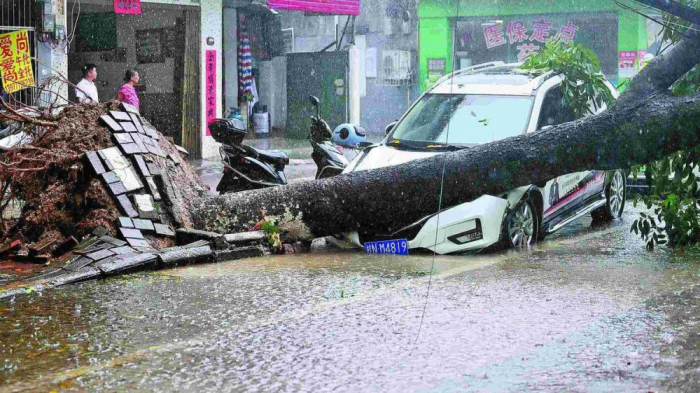Typhoon Talim has lashed south-eastern China and displaced 230,000, as large swathes of Asia reel from torrential rain and extreme heat, according to BBC.
It disrupted flights and shut fishing villages and coastal tourist spots, but weakened on its way to Vietnam.
In Japan, some 60 people fell ill with heatstroke, while parts of China are seeing record-high temperatures.
Over in South Korea, the death toll from days of torrential rain and landslides rose to 41.
Talim whipped Guangdong province with winds of nearly 140km/h (87mph) Monday night, before making landfall in neighbouring Guangxi on Tuesday.
Trees fell on moving vehicles, a whale washed ashore and a freezer full of ice cream floated off in floods as the storm barrelled through Guangdong.
Firefighters rescued passengers trapped in their cars by fallen tree branches as they cleared roads of debris and assisted other motorists to safety, state media reported.
Local authorities called back some 2,700 fishing vessels and ordered more than 8,200 fish-farming workers to be evacuated as storm surges lashed the coast, Xinhua said.
The typhoon hit two days after a remote town in the north-western province of Xinjiang saw China's highest temperature on record at 52.2C (126F).
In Japan, Tokyo Disneyland and DisneySea temporarily halted some outdoor events and shows on Monday due to the blistering heat.
Japanese authorities have also issued heatstroke warnings in 32 out of the country's 47 prefectures, as temperatures in many places rose to nearly 40C.
In South Korea, rescuers on Tuesday pulled the last body out of a flooded tunnel in the central mountainous region of Cheongju.
South Korean President Yoon Suk Yeol has said he will "completely overhaul" the country's approach to extreme weather, as such events will become "more commonplace".
Meanwhile heatwaves also brought searing temperatures to the US and Europe overnight. The hot weather is expected to last until next week.
More about:
















































